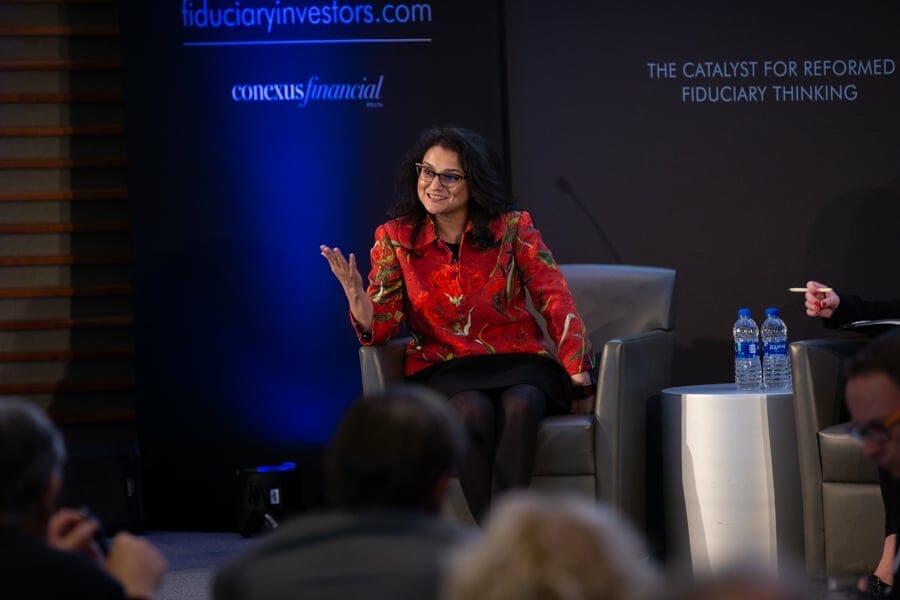Look no further than the economic travails of Italy and Japan to see the perils of Modern Monetary Theory, MMT, said Sonal Desai, CIO, fixed income at Franklin Templeton. Speaking at the Fiduciary Investors’ Symposium at Harvard University, she countered the arguments of Stephanie Kelton, a leading MMT scholar at Stony Brook University and senior economic advisor to presidential candidate, Senator Bernie Sanders who espoused the virtues of MMT in a previous session MMT: A solution to broken policy?
In contrast, Desai pointed to the lack of growth in both moribund economies as examples of how printing money doesn’t work. She argued that Italy “had something like MMT” going on before it joined the euro, whereby the Italian government was the buyer of last resort of Italian government debt. Elsewhere, Japan is currently labouring under debt levels of 240 per cent to GDP. Although neither country has runaway inflation, neither has any growth either, she argued. It means that “whatever these governments have done” hasn’t translated into “a higher quality of living” because the debt has run out over future generations. “Italy and Japan stand as cautionary tales; it is not something to emulate.”
Privilege
Printing money would test US institutions validity and robustness and would call into play the role of the dollar as the sole reserve currency. Sonal argued that being the world’s reserve currency is a privilege, not a right.
“You don’t choose to be the world reserve currency – the world chooses you.”
The notion that the US could print as much currency as it wants because it is the deepest and most liquid debt market in the world and there will always be demand, is not a given. The world has only chosen the US because of well-managed policy that includes sound fiscal and monetary management.
“If this goes by the wayside, it does mean you could have a different reserve currency.”
She flagged that history has witnessed many reserve currencies before the dollar arrived on the scene – and that the US tenure has been comparatively short. However, she dismissed the idea that China’s renminbi could replace the dollar anytime soon because China’s capital markets are not open.
“What defines a reserve currency?” she asked. “It means you can go to a village in Africa and pay in dollars. You can’t take the Chinese renminbi outside China. There is a long way to go before China assumes this role.”
Desai also argued that the idea that a country that prints its own money will never default is flawed. There are several ways governments can default, for example, due to rising inflation, resulting in a default, in effect, to its citizens who experience rising prices and “get back less.” Another way is via currency depreciation. US treasuries are held globally so that when the dollar depreciates this also translates into a version of debt default.
“US treasuries are the most liquid asset out there, and when there is a depreciation it is a version of debt default because you are getting back less than what you anticipated when it was issued.”
A licence to print money puts power in the hands of politicians, which carries perils in an era of populism. She said MMT was “incredibly seductive” for those on the both on the right and left, enabling them to offer tax cuts “ad infinitum” on one hand, or free education and green new deals on the other. She said MMT was “like a blank cheque given to politicians” at a time trust in politics is lacking. Going down this route would demand “strength and belief in institutions,” she warned.
Inflation
Desai told delegates that it was a “heroic assumption” to think inflation was “dead.” Indeed, issuing unlimited debt has powerful consequences for inflation.
“I have to tell you, I do care how many [Treasuries] are issued. We talk about inflation and the rise in goods’ prices, but there is also inflation of asset prices.”
She said that when asset price inflation increases it is not productive.
“If you triple the issuance of an asset, like supply of any goods or services, prices will crash and as owners of that asset that is worrying.”
She said that governments would be in the position of having raised all the revenue they needed, without doing anything to mitigate inflation.
“Spending trillions, and not one person concerned about inflation? You have to centre inflation risk in the budget process,” she concluded.




